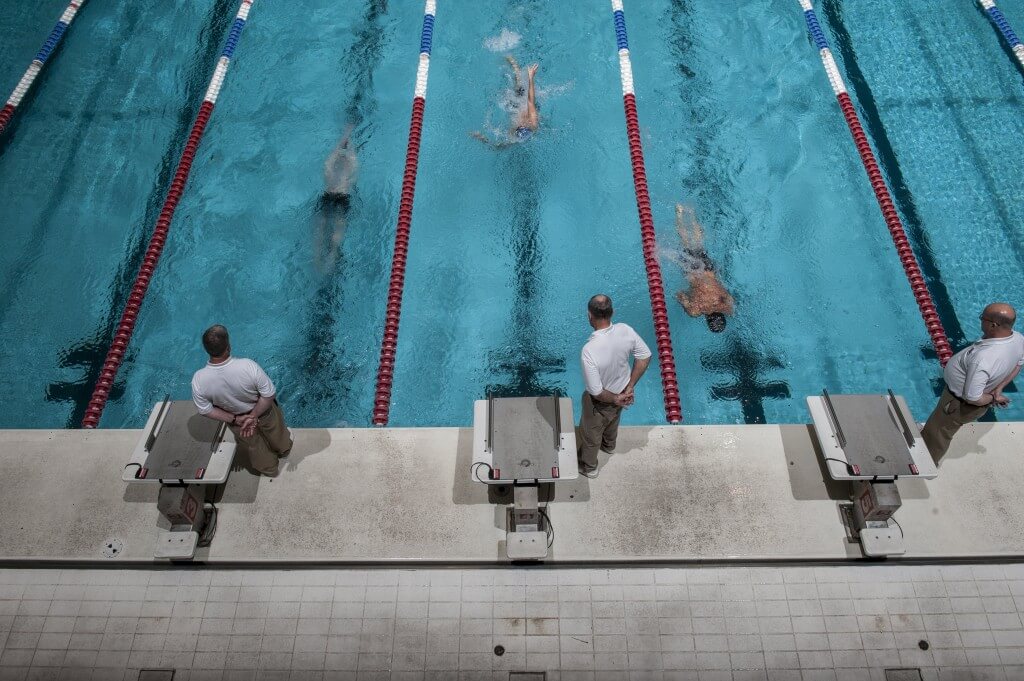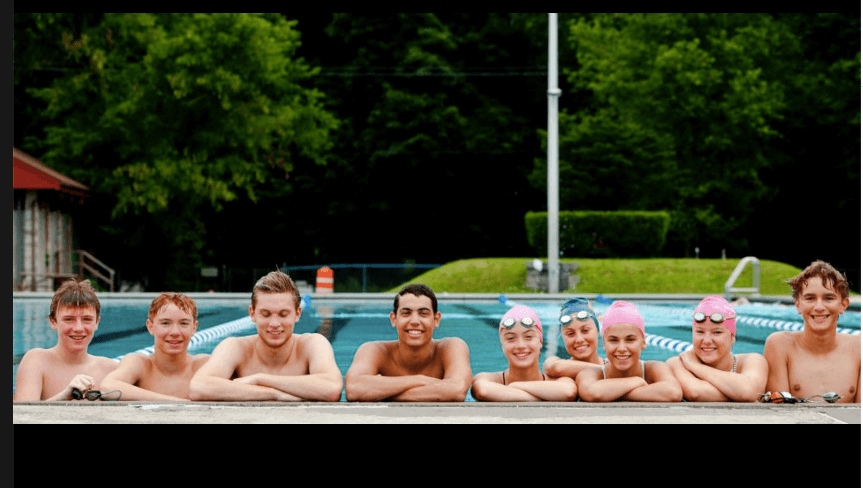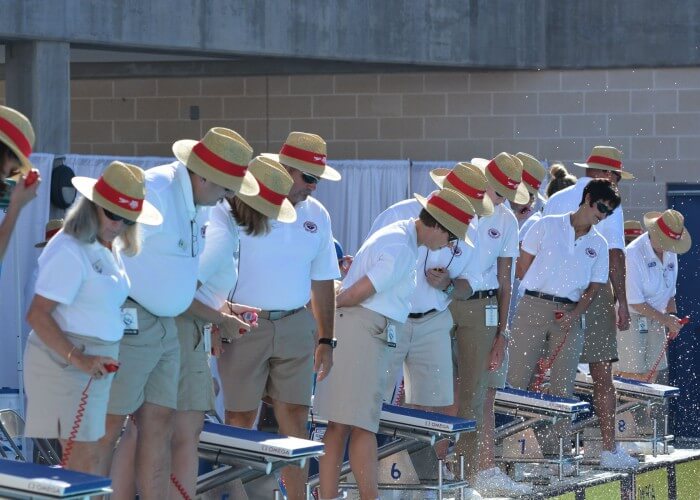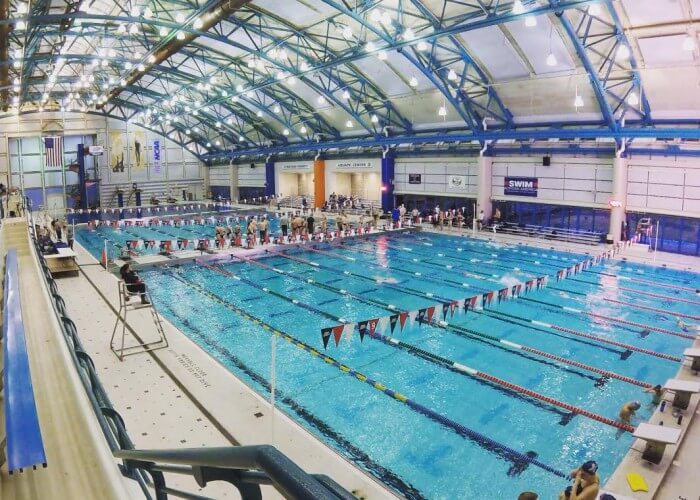Volunteer Spotlight: Mark Amodio, Professor and Head Official’s Chair

By Julia Cunningham, Swimming World College Intern
Loving a sport can bring out the sentimentality in all of us. Where would I be today without swimming? What will happen when my career is over? How can I give back? Parents, timers, officials, whether they were swimmers in a past life or are related to a current swimmer, have found a way to express their appreciation for the sport through their volunteer work.
Mark Amodio, Professor of English and Chair of English and Director of Medieval and Renaissance Studies at Vassar, Faculty Athletic Representative at Vassar, Head Official’s Chair for Metropolitan Swimming and father of two swimmers, first started his relationship with swimming when a community pool opened near him when he was seven.
At that time, parent involvement in the sport was almost unheard of. “My parents only had one car. It was a very different time then. They weren’t going to drive you to practice, and I don’t think either of my parents ever came to one of my high school meets,” Amodio said. “Again, it wasn’t because they ignored it, it was because back in the ‘60s and ‘70s life was very different.”
He swam just in the summers, and continued through high school. Collegiate swimming was a different story, however. “I took six classes my first semester, and I had a job lifeguarding at the pool and I had another job working at a record store off campus, and I was commuting – that was the big thing – so I was forty minutes away.” Swimming wasn’t as much of an option for Amodio in college. He went on, “But I transfered the middle of my junior year to UC Berkeley, and at that time the men’s team had just won the second of what was then two consecutive national titles. There was no way I was swimming for them,” he laughed.
After this brief intermission, Amodio found himself back on deck when his children, specifically his younger son Luc Amodio, took up swimming. I sat down with Amodio to talk about his involvement, both volunteer and elected, in the sport.

Photo Courtesy: Madison Carroll: Luc Amodio is the third from the left
When did you start getting more involved in swimming through volunteer work?
What happened, you know, swim meets are really boring. It didn’t take me long. The first year my daughter swam, she’s a couple years older than Luc, she started swimming when she was seven, so Luc probably started swimming around when he was five. But he was a drowner. They were always afraid he was going to drown. So that first season it was really a ragamuffin team of about 12 kids. It wasn’t in a league or anything. The next year they got more organized, got into a league, so I think that’s when I started officiating because I realized they needed help on deck. I wound up taking over that team and running that team for a number of years. We went from being this little YMCA team back to being a full-fledged USA swim program, then the Y closed town. I ran that club. I did everything for that club from getting into USA swim to designing the T-shirts, selling the T-shirts, you name it.
Was that a natural progression?
Oh, absolutely. I actually had my coaching certifications for a while because his team was so small, there were meets where I would be his coach at least to get him on deck. Then we’d hook him up. The swim world, as you know, is a pretty small world and you start to get to know people. And that helps.

Photo Courtesy: Donna Nelson
Explain your role as the Head Official’s Chair in Metro?
That’s an interesting role. I think we have 230 officials right now. We just had a really long three weeks. We have a Zone Qualifier Meet, where a lot of teams will do that at their championship meet, Metro has its own meet. So I ran that meet, then we had our senior championships the following week, which was really cool because we had seven or eight Trials cuts during the meet. So I ran that meet, and then I actually went back to work a day at the Big East Championship, because NCAA swimming is reaching out to USA Swim: they want more USA Swim officials involved in NCAA competitions.
Have you ever missed a class with all this time spent away from campus?
Believe it or not the only time I’ve ever missed class is to be at States. I always miss class that Wednesday because that meet starts 10:00 on Wednesday morning, so I’ve missed that the last four years. Outside of that, believe it or not, I haven’t missed a class for any other reason except for those four times in probably 20 years. That was a sacrifice I thought was worth making, and we rescheduled.
Explain the responsibilities of an official on deck?
Every meet you have a number of officials. You have stroke and turn judges, then you have a chief judge. Then, at a bigger meet, like our championship meet, you have five chief judges per session. So you have one in each corner and a team lead chief judge. Then you have your starter, referee teams, and then you have your meet referee who sits on top of everything. At some meets you also have an admin referee who takes care of the administrative stuff. I’ve played all of these roles.
Can you describe your role as the Faculty Athlete Representative?
It’s an elected position. My main role is to educate. To educate both teachers and athletes. Because you’d be surprised what happens. One of the nice things about being the Faculty Athletic Representative at Vassar is that academics come first. There’s no question about that. We try to work as much as we can to ensure that the student-athletes follow their athletic goals as much as they follow their academic goals, but when push comes to shove it’s really not much of a match.
As our athletic programs have improved, there’ve been growing pains. In the past, we never had teams making playoffs. Now we do, so now we have to educate the athletes to notify your instructors about missing class more than three days in advance. When that happens, I get messages from both sides– “What do I do?”
It’s really just trying to see how we can accommodate the student-athlete and how the student athlete can satisfy the course requirements. It’s mostly just education for that part. And then another part of what I do is I take part in all the reviews of the department, so I work closely with the athletic director. I was on the committee that hired the new athletic director this year. I’m not part of the department, but I’m somebody who looks over the department and tries to help them with issues that they have too.

Photo Courtesy: Big East Conference
How do you balance all of this?
There always could be more hours in the day. February is the USA championship season so this was my busiest stretch of the year. Now I’m trying to back away from my local commitments a little bit because one, I want to go to Nationals. If I apply and get accepted I can officiate DIII Nationals. I’m also a volunteer meet referee for a big club that runs meets out of NIAC, which is a little over an hour from here. So I got home Friday night from the pool at 10:45. I was on the road going back there 5:30 the next morning, got home about 8:30 that night, and then same thing I was on the road 5:30 going back there. Monday was a rough day for me.
But I love the sport, I love giving back to the sport. It’s really great to be in the middle of things. There’s some clubs who’ve graduated a number of Olympians, so these are high power coaches and it’s their livelihood so they take it very seriously. And there I am in the middle, educating people and making decisions, and it’s really kind of fun! It’s interesting.
The main thing, it’s great to see the kids swim– at the high level, at the low level. I can remember when Luc went to his first Silvers. Again, it must have been when he was about 11 years old. So imagine: It’s a 50 meter pool, eight lane, 50 meter pool set up as short course yards so it’s a big facility and a lot of deck space, and it’s just jam packed. And here’s Luc with a coach and the only other swimmer from his team who made Silvers that year, and they’re on deck looking for all the world like lost little kids. But it was just fabulous, it was such a great learning experience.
USA Swimming has launched a campaign to recognize our terrific volunteers all month long! Honor all of the volunteers in your life this March by snapping their photo and posting with #1VolunTeam on Twitter, Facebook, or Instagram. Tag @usaswimming and @swimmingworldmag too!




Awesome to see Mark recognized like this!
Thank you for doing what you do! Awesome!
Yay Mark !